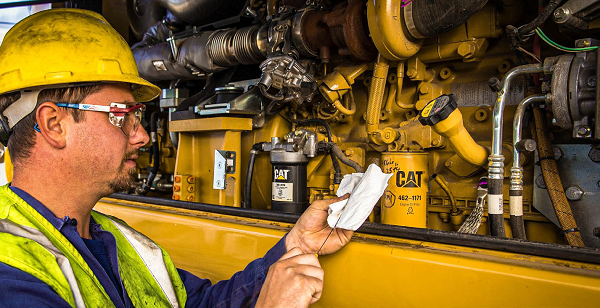There is no argument that machine failures can be a costly and time-consuming process. Avoiding major component failure can be as simple as prioritising Scheduled Oil Sampling (SOS) for machinery.
With 24 years’ experience in the Hastings Deering SOS Lab, Craig Boyden has been guiding customers in extending the life of their machines with predictive maintenance analysis by processing fluid samples.
Each routine sample undergoes 38 analytes, commonly referred to as tests. These tests, once analysed can provide a warning of an imminent breakdown, anticipate situations of risk and highlight preventative maintenance approaches.

“With a precise diagnosis of equipment fluids, our team can identify faster and even anticipate possible errors in areas where customers may not even know it’s happening,” said Craig.
“What we do can be broken down into three areas: have you got the right fluid, is it free from contamination and is there no abnormal wear occurring,” he states. “If the answer is not right on each of those things, then we try to spell out what the problem is. “Some tests can identify exact areas for repair, others can drive recommendations for on-going service and maintenance.”
Providing routine sample analysis within 24 hours ensures that customers can implement many of the recommendations in a short amount of time and, when caught early, often don’t require a large capital investment.
“With our routine sampling, we endeavour to turn around large numbers of samples quickly and not compromise on the quality. We’re testing everything from how much iron, how much chrome is in the fluids, oil viscosity and more.”

Possibly the most important test in the oil analysis process is elemental analysis, providing detection on both the wear of moving parts, and the presence of contaminating substances. In a diesel engine, for example, one risk is getting contamination. If a sample indicates that there is the presence of silicon and aluminum in the oil, the ratio of these materials can highlight that dirt is in the system.
With the abrasive nature of dirt, the team can then test for increasing levels of other metals that can help to guide an indication of the source of the contaminant entry.
“As an example, if we see chrome increasing, we know that the piston rings are made of chrome, we can identify that the dirt contamination is coming in through the air cleaner,” said Craig.
“This can happen for a number of reasons. There may be a crack in the air cleaner, it potentially wasn’t fitted properly and left gaps, these small things can be pulling dirt in through the engine. We’re able to narrow down that problem area so that you know exactly where to go and do the repair on the machine.
“The thing is you often don’t even know this is happening. Regular sampling can pick up those small details that can become larger, more expensive damage if left unidentified.” By regularly conducting routine sampling, companies only have benefit to gain. This preventative testing helps to increase the life of components, reduces wear, spare parts and unnecessary oil changes – increasing the up-time of machinery.

The Hastings Deering Lab team made up of Lab technicians, Interpreter Filtergrammers, Administrators, Programmers and Product Support Staff, are responsible for making theHastings Deering SOS lab the single largest Cat Dealer laboratory in the world. Not confined to simply Caterpillar equipment, the lab is a one-stop shop for mixed fleets. “45 per cent of samples coming in through our lab are non-Cat machines. We do everything from motorbikes to aircraft; anything with oil, coolant, grease, diesel, we can manage that sample,” said Mr. Boyden.
Hastings Deering offers the Oil Commander software, which provides customers with the ability to track, analyse and manage the condition of the fleet through fluid samples.
This online platform helps customers to track results, understand sample interpretations and record corrective action. About the Hastings Deering SOS Lab Hastings Deering have been providing fluid analysis to various industries since 1973. Their modern ISO 9001 accredited laboratory located at Archerfield, Brisbane specialises in the analysis of fluids and debris from machinery across all industries. The laboratory provides routine analysis and interpretation of lubricating oil, coolant, grease, diesel and emulsion fluids. Also, specialising in a range of microscopy techniques to identify material from filters and magnetic plugs. https://secure.hastdeer.com.au/hdsosweb/Login.aspx


